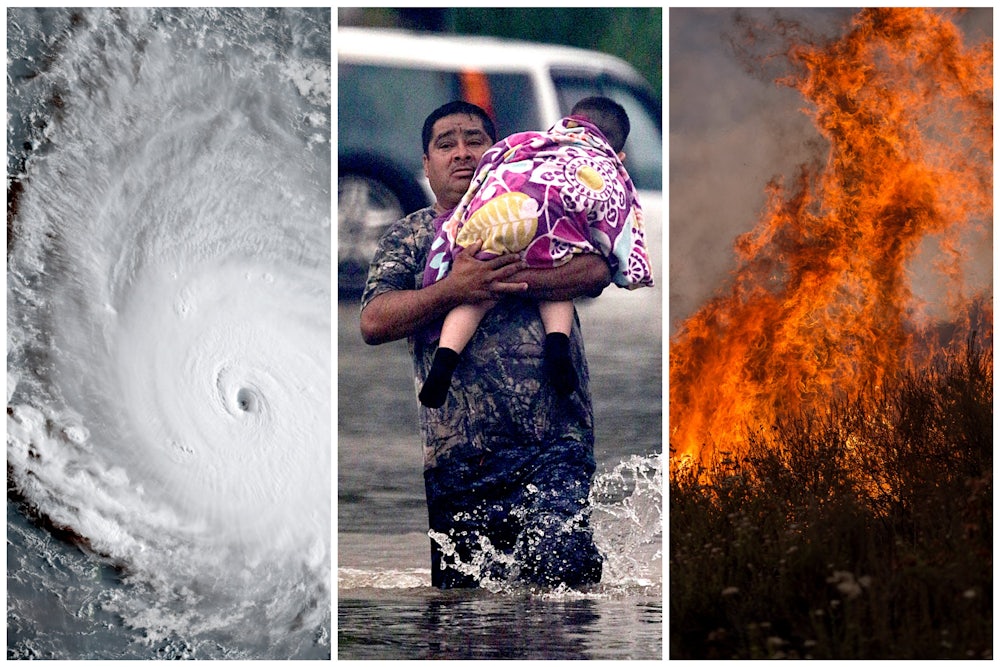The days leading up to Hurricane Harvey’s landfall in Texas last week were some of the most nerve-wracking in meteorological history. Forecasters watched helplessly as a true monster storm—one that would eventually become the most extreme rain event in recorded American history—moved toward Houston, the country’s fourth-largest city. They gave the most dire warnings they could, developing new colors for maps to show unprecedented intensity, and using more hyperbolic language than ever before. But there was no avoiding the mass devastation. Homes were destroyed. At least 60 people died. The flooding has not even fully receded, and now forecasters are tracking another frightening storm that they don’t quite have the language for.
I am at a complete and utter loss for words looking at Irma's appearance on satellite imagery. pic.twitter.com/B0ewFyvcSv
— Taylor Trogdon (@TTrogdon) September 5, 2017
Hurricane Irma is not only the most powerful Atlantic Ocean storm in history, but has maintained its terrifying wind strength for longer than any other hurricane. Irma is a Category 5 storm—the most powerful rating—but it’s so strong that some scientists are wondering whether to create a Category 6. Worst of all, Irma is threatening carnage worse than Harvey, having already wreaked havoc in the Caribbean as it barrels toward the mainland U.S., where both Florida and South Carolina have declared states of emergency.
These two massive storms don’t even represent the full extent of the world’s extreme weather woes right now. As Vox reported last week, “Unusually heavy monsoon rains over the last several weeks have killed over 1,000 people across India, Nepal, and Bangladesh. In all, over 41 million people have suffered the direct impact of the rain.” British Columbia is having its worst wildfire season in recorded history. History-making heat waves and drought are driving an unusually strong wildfire season that’s burning up the American West. Every county in the state of Washington is under a state of emergency, and ash is falling like snow in Seattle. The smoke is affecting air quality all the way to the East Coast.
Some extreme weather is to be expected. It is hurricane season, after all. It’s also wildfire season. It’s summer in the northern hemisphere, so it’s pretty hot in a lot of places. And in South Asia, it’s monsoon season.
But the extreme weather events right now are some of the most extreme we’ve ever seen, threatening more human lives than usual. Climate scientists have been warning us for years about this very scenario. “We have extensive scientific evidence that extreme events are increasing around the world, and will continue to increase as climate change gets worse,” said Noah Diffenbaugh, a professor of earth system science at Stanford University. “We see global-scale temperature increases. Global sea level is rising. The amount of heat and atmosphere and ocean is increasing. The amount of water vapor in the atmosphere is increasing. What we’re seeing as a result of those changes is an increase in not only the mean, but the tails of destructive weather events.”
Climate change does not result in, say, hurricanes in the spring and wildfires in the winter. And no one is claiming that these wildfires or hurricanes or floods would not have happened without global warming. But climate change has increased the likelihood that all of these events would be particularly devastating. Through our carbon emissions, humans have already warmed the atmosphere and ocean roughly 1.53 degrees Fahrenheit. The warmer atmosphere is able to hold more moisture, meaning more water vapor can fall as rain, snow, or hail when storms occur. The warmer ocean can intensify hurricanes and tropical storms, because hurricanes feed on warm ocean surface water. The warming climate also tends to dry out areas that are already dry, which can exacerbate wildfires.
... especially in the western US, where warmer temperatures are drying out the forests and extending the wildfire season.
— Katharine Hayhoe (@KHayhoe) September 6, 2017
Some people don’t like to talk about this kind of thing during life-threatening storms. I agree with some of the reasoning, particularly the argument from Cody Permenter, a native Texan who wrote at Grist that victims suffering from Harvey probably aren’t worrying about climate change when they’re trying to rebuild their homes. “To an audience that already distrusts mainstream, well, anything, you can easily come across as callous and uncaring toward victims of the storm,” he wrote. “If you truly care about mitigating climate change, playing ‘I told you so’ while people are dying and losing their homes isn’t the way to do it.”
But this is not an “I told you so” moment. This is a “stop destroying lives” moment. As these historic weather events become increasingly common, President Donald Trump is working tirelessly to put more greenhouse gases into the atmosphere—ensuring that the threat of extreme weather will only get worse. He’s trying to scrap as many Obama-era climate policies as possible, slashing funding for climate research, and opening up huge amounts of land for coal mining and fossil fuel drilling. On Wednesday, as Hurricane Irma inched closer to the U.S. mainland, Trump visited an oil refinery to push tax cuts to benefit carbon polluters. Meanwhile, his EPA chief, Scott Pruitt, has said that it would be “opportunistic” and “misplaced” to use events like Harvey to raise concerns about climate change.
We would not have to talk about climate change during storms if the government were making some sort of earnest effort to fix the problem. Instead, the Trump administration is ignoring the problem—and it wants you to do the same. But many thousands of lives are being lost or destroyed, and to pretend that climate change isn’t a major culprit in these tragedies is simply negligent and cruel. This is precisely why we ought to politicize Harvey, Irma, and other extreme weather: It’s not opportunistic, but the humane thing to do. The real opportunism is coming from those who are disregarding scientific facts in order to advance a fatal policy of climate denial.
